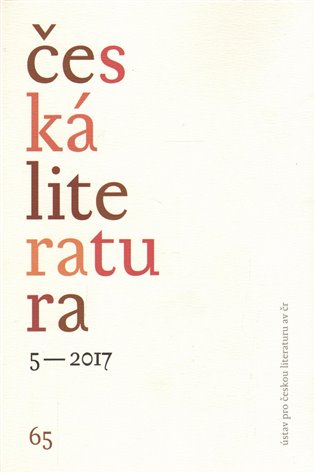
Stephanie Kurschus: European Book Cultures. Diversity as a Challenge.
Stephanie Kurschus: European Book Cultures. Diversity as a Challenge. Wiesbaden, Springer VS 2015. 383 strany.
More...We kindly inform you that, as long as the subject affiliation of our 300.000+ articles is in progress, you might get unsufficient or no results on your third level or second level search. In this case, please broaden your search criteria.

Stephanie Kurschus: European Book Cultures. Diversity as a Challenge. Wiesbaden, Springer VS 2015. 383 strany.
More...
This study attempts to present a comparative interpretation of the motif of the double in selected works by Dostoyevsky and Hostovský. Attention is focused on the way the double motif is involved in the construction of the literary work as a unit of dialogic speech, as conceived by Mikhail Bakhtin. The psychological motivation behind dialogue with a double, which is indicated by Bakhtin, is complemented by an exposition from the standpoint of Girard’s concept of unspontaneous desire and Freud’s conception of the double as a symptom of the uncanny. The thematization of doubleness accordingly appears to be a criticism of the disrupted experience of intersubjectivity, as characterized by Julia Kristeva, but also in a broader sense by Edmund Husserl. Although on the one hand the double emerges as an ally, confirming the existence of the original hero as correct and good, at the same time he always threatens the sovereignty of the original subject, just like Girard’s intermediary. It turns out that the ambivalent nature of the double motif gives rise to the aesthetics of Dostoyevsky’s and Hostovský’s texts, in which doubles often take control of their prototypes’ lives, attempt to eradicate them and take their place in the world. In the case of both authors, this threat manifests itself in particular at the level of language, when the double appropriates (and alienates) the speech of the prototype. Analysis of the selected motif then also illustrates that Hostovský, like Dostoyevsky, is an author who can be classified in the polyphonic tradition of novel writing.
More...
This study focuses on the Československý spisovatel publishers’ reading procedures for Hrabal’s output in the latter half of the 1970s. To be specific, it deals with their reading of Postřižiny (Cutting It Short, 1975), Slavnosti sněženek (Snowdrop Festival, 1977), Krasosmutnění (Joyful Blues/Beautiful Sadness, 1977–8) and the short story collection Každý den zázrak (Every Day a Miracle, 1978). As these procedures took place against a backdrop of dispersed censorship supervision (with socially ‘unreliable’ authors, such as Hrabal, being read by ‘superreaders’, who were representatives of focused ideological supervision) I compare their structure with that of reading procedures in the 1960s. Whereas censorship in the 1960s was an external supervision institution (i.e. the Central Press Supervision Authority), the proofreaders and editors intuitively anticipated its possible objections and reflected them to some extent in their standpoints, during the 1970s the supervision institution in the form of superreaders moved right into the editorial office. However, one should not assume there was a conflict between the editors and the superreaders purely from the definition of their roles. In the three cases under review, two superreaders were assigned to one title (only one in the case of Postřižiny), but their opinions differ — what would have got past one of them is pulled up by the other one (this is particularly the case for the short story collection Každý den zázrak — Every Day a Miracle). Hence not even the superreaders can be considered a priori to be critics of Hrabal’s apolitical style, and in the given case it is Vítězslav Rzounek, who surprisingly becomes an apologist for Hrabal’s 1960s short story work. Hence this study follows the readers’ assessments in detail: their argument structure, apparent and hidden apologetics (necessarily ambivalent due to the very nature of the reading procedure) and their thematic synopsis; of course, it also focuses on the overall reading procedure mechanism. I endeavour to reveal the significant way (but nothing like as significant as normally supposed) in which the readers’ objections were reflected in Hrabal’s subsequent work. It can even be said that in the 1970s Hrabal is a different kind of writer than he was during the 1960s (when he repeatedly reworked his entire oeuvre). Now he was very sparing in his text interventions, while it can be said that in no significant way do these changes diminish the artistic value of his work. A look at the reading procedure in the latter half of the 1970s lets us see the extent to which Hrabal became a compact writer, who only slightly retreats before the pressure of the times (and the editors, including the superreaders’ opinions). The primary topic of the reading procedure turns into the ongoing replacement of the ‘old’ (meaning the 1960s literary output) Hrabal by the ‘new’ one who wrote his works in the 1970s. Those who have assessed this find him more sensitive without being unhealthily sentimental, offering a more socially aware standpoint, criticizing the petty bourgeoisie while jettisoning decadent trends that were now passé, i.e. existentialism, late surrealism and not least eccentrically erotic motifs. Using the superreaders’ metaphors, we can detect a more general literary topos behind this subject matter, which points the way towards a New Deal (or Testament) which supersedes the old one by showing it in a new light. Hence the ‘new’ Hrabal presents readers at that time with the promise of the arrival of a better society.
More...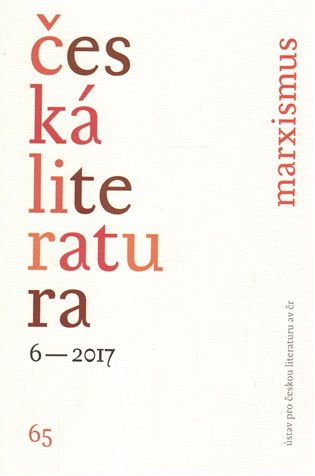

The present study reconstructs the fortunes and viewpoints of literary critic, ideologist and politician Ladislav Štoll between 1968 and 1973. My main source was the collection of private papers of the same name housed at the Academy of Sciences Archive. Ladislav Štoll’s position and public role were undermined by the reformist meeting of the Czechoslovak Communist Party Central Committee at the turn of 1967/68 and meetings between a party committee and the Czech Literature Institute Council. In the Prague Spring period leading up to August 1968, Štoll withdrew from the public arena and stepped down from his executive positions at the Academy of Sciences. He faced criticisms and media attacks for his Stalinist past and his role as the one who announced the repressive measures against pro-reform authors at writers‘ conventions, including e.g. the (unproven) accusation that he took part in the political trials. He kept his Soviet friends and literary historian colleagues informed about the unsatisfactory situation in Czechoslovakia, and welcomed the occupation on 21st August as the moment the historical trajectory of Czechoslovakia veered away from counter-revolution, while prioritizing solutions that would not jeopardize state and national sovereignty. From autumn 1968 until mid-1969 he remained in seclusion, focused on research activity and travelled abroad. From autumn 1969 until summer 1970 he championed the consolidation of the humanities and social sciences as an employee of the revived Czechoslovak-Soviet Institute, consulting Soviet academics regarding the consolidation of Czechoslovak Russian studies, requesting their advisory intervention and arranging for the publication of key normative documents. He worked in the Czechoslovak Communist Party Central Committee and its Ideological Commission on party analyses of the post-1956 cultural and political developments that led to the Prague Spring. He reassessed his views on these developments and began to see them as disastrous from the outset, and his previous dialogue with the reformists to have been too generous. He welcomed the results of the consolidation process and its codification in Lessons from the Crisis. In July 1970 he became Chairman of the Czechoslovak Academy of Sciences Arts and Sciences Committee and indirectly managed the reorganization of the Institute of Czech Literature. In February 1972 he returned to the consolidated Institute of Czech and World Literature as its Director, while becoming Editor-in-Chief of the Česká literatura journal. He also took on a number of other positions and tasks in various supervisory and academic bodies and committees. It was both because of these duties and for health reasons that he again drifted away from work at the Institute.
More...
Jan Mervart: Kultura v karanténě. Umělecké svazy a jejich konsolidace za rané normalizace. Praha, Nakladatelství Lidové noviny 2015. 176 stran.
More...
This study attempts to reconstruct key elements in the thought of literary critic and folklorist Bedřich Václavek. Václavek is generally recognized as a prominent figure in interwar literary development and as a researcher who examined genres of popular tradition that had previously eluded scholarly attention. Yet his thought is not well known as a synthetic whole. The reception of his work is divided into two separate fields, and interpreters have paid little attention to the importance of his folkloristic work on his understanding of literature, and to the importance of his literary theory on his understanding of folklore. Václavek’s work as a whole remains little known. Nevertheless, Václavek dealt with parallel issues in his two main fields, elaborating complementary conceptual frameworks, each of which contributed to the originality of the other. If we view Václavek only as a literary critic, we may see him as a figure who voiced and confronted crucial challenges of his times, but who does not particularly stand out from among the many other critics of his day who made similar attempts to bridge the experimental literary ambitions of the avant-garde and the social objectives of those political movements that the avant-garde most frequently embraced. And if we view Václavek only as a folklorist, we may see him as a careful scholar who contributed to the development of his discipline, but who did not go beyond its boundaries to lay out the more general social importance of this work. It is only when we look at Václavek’s work in its entirety that we perceive the conceptual innovation he brought to literary criticism from folklore studies, as well as the social importance acquired by folklore studies when it is connected to the overall aesthetic expression of the people in society. What emerges from a synthetic reconstruction of Václavek’s thought is his systematic attempt to explain the concept of “people” and its role in aesthetic development, both in the literary sphere and in the sphere of oral tradition — and (perhaps even more importantly for Václavek) in the space between the written and the spoken word, where literature and folklore meet and general “culture” emerges from this fusion.
More...
Marek Kwapiszewski: Od marksizmu dogmatycznego do humanistyki rozumiejącej. Badania nad romantyzmem w IBL PAN w latach 1948–1989. Warszawa, IBL PAN, 2016. 232 stran.
More...
Katarzyna Chmielewska’s text presents in a short and synthetic way the history of Marxist literary research in Poland. The text presents both orthodox Marxism and so its later changes. The author pays particular attention to the paradoxical phenomenon of Marxism without Marx, and so Marx’s anathemas in the 1990s, when the researcher was thunderingly rejecting his achievements and benefiting from his inspiration.
More...
This study deals with a conception of postmodernism that is based on the ideas of the American Marxist theorist Frederic Jameson. The first, theoretically-based section does not define literary postmodernism as a particular style, but as a cultural landmark, basically associated with the broader socio-economic, epistemic and ideological context. The basis of postmodern epistemology, which critically opposes the epistemology of modernism comprises a critique of the Carthesian subject and the concept of reality as a whole. This critique results in the problematization of the subject as an autonomous entity and the fragmentation of reality. My study asserts that the ideological function of this postmodern critique also works to delegitimize all “totalitarianizing” tendencies, while legitimizing a particular kind of cultural reproduction. The second part of the study focuses on interpreting prose works by Emil Hakl (Skutečná událost, An Actual Event, 2013) and Václav Kahuda (Vítr, tma, přítomnost, Wind, Darkness, Presence, 2014), which I believe artistically portrays the consequences of conceptualizing the subject and reality that are typical of postmodern culture. The fragmentation of reality, the self-alienation of the subject and the collapse of historicity in Hakl’s prose does not allow for the creation of a space in which radical acts are possible. Václav Kahuda’s prose is a fragmentation of reality, and the loss of the essence of the subject is overcome by the construction of a paranoid universe and a shift towards a monistic view of an all-pervasive transcendental principle.
More...
Peter Bürger: Teorie avantgardy. / Stárnutí moderny. Stati o výtvarném umění. Přel. Václav Magid, Tomáš Dimter, Martin Pokorný. Praha, AVU 2015. 348 stran.
More...

Richard Müller — Josef Šebek (edd.): Texty v oběhu. Antologie z kulturně materialistického myšlení o literatuře. Praha, Academia 2014. 723 stran.
More...
Fredric Jameson: Postmodernismus neboli kulturní logika pozdního kapitalismu. Přel. Olga Sixtová a Josef Šebek. Praha, Rybka Publishers (ve spolupráci se SOK — Sdružením pro levicovou teorii) 2016. 536 stran.
More...
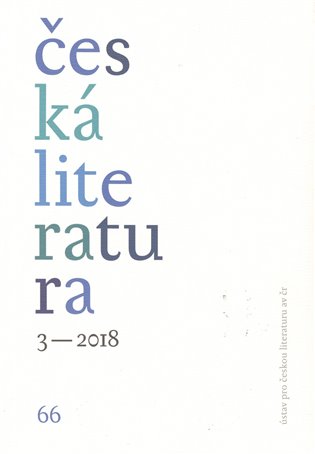
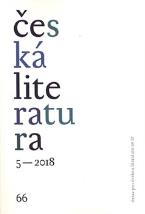
T. G. Masaryk — Josef Svatopluk Machar: Korespondence. Svazek I. 1893–1895. Edd. Helena Kokešová, Petr Kotyk, Irena Kraitlová. Praha, Masarykův ústav a Archiv AV ČR 2017. 453 stran.
More...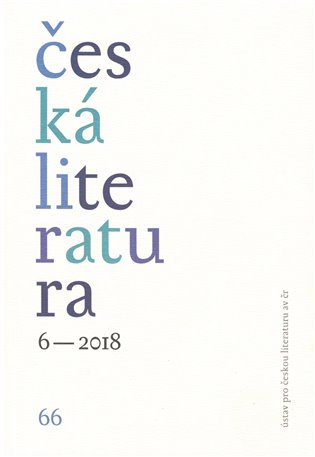
Nora Schmidt: Flanerie in der tschechischen Literatur. Flaneure. Prager Spaziergänger und flanierende Schreibweisen von Jan Neruda bis Michal Ajvaz, Epistemata Literaturwissenschaft, Bd. 872. Würzburg, Königshauses und Neumann 2017. 494 strany.
More...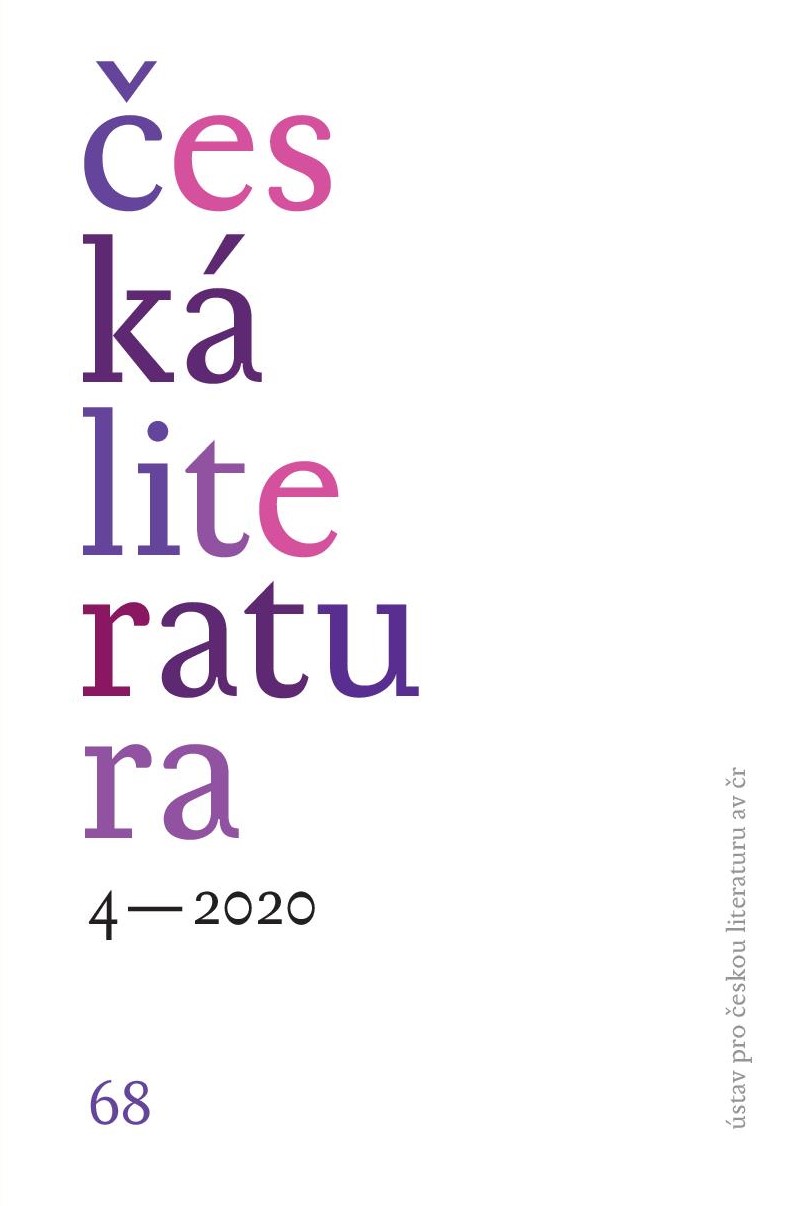
This article deals with the issues of introducing web resources into subject literary bibliographies. This issue is at first analyzed on the general level as the methodological challenge of online sources systematic introduction into the context of managing current bibliography and then case studies follow targeted on specific problems of internet material bibliography treatment. Firstly one discusses the issues related to bibliographical processing of online documents (web pages, online journals, etc.), which are in complex and variable relations to those available in print. An attention is paid to the methodological issues, in particular providing criteria of web resources selection. The need for archivization of bibliographically processed materials which we assess as the crucial element of any systematic bibliographical processing of Internet materials will be also highlighted. In the following part study presents the preliminarily classification of the new specific genres of internet content: blogs and literary forums. Firstly the Polish literary blogosphere is analysed and preliminarily typology of this document type is introduced. Later a phenomenon of literary forums is taken into consideration. Based on an example of poetry forum Nieszuflada.pl more detailed quantitative analysis of this resource type is given and issues of authorship attribution in the digital environment are discussed.
More...
The present work focuses on two types of narrative perspective — cognitive and perceptual. The cognitive perspective is understood to comprise the ways in which the fictional world can be mentally conceptualized from the standpoint of the characters, or such a perspective is a manifestation of collective opinion, which of course is not the subject of this work. The perceptual perspective is understood to comprise sensual perception, through which the phenomena or events of the fictional world are filtered. Based on Wolf Schmid’s conceptualization, we distinguish two basic aspects of narrative perspective, the first being the way evens are perceived or understood, while the second is the way they are represented and realized within the narrative. Another essential feature is the function of both perspectives, which manifests itself not only in terms of what is filtered by these perspectives and what is reflected in the semantics but also reciprocally. It is then our primary task to follow the way both perspectives functionally determine each other. We perform an analysis of this phenomenon on the corpus of Jan Neruda’s and Jakub Arbes’s prose works, which were written at around the same time. Firstly we show how the identified types of perspective are realized in the prose works of both authors, who each represent a differing realist school in Czech literature. We then focus on their functional correlations and find that Neruda’s prose work is characterized more by situations in which a cognitive perspective on a rationally modal basis determines the perceptual perspective, so that sense perceptions or illusions are corrected by the rational cognitive framework, whereas in the case of Arbes’s prose works under review, the reverse is for the most part the case. The typologically different functional correlation method of both perspectives is manifested in the sphere of diegesis, narrative strategy and composition, as well as in the conception of the fictional time-space, for example. Just as the usage of the perspective type or of the functional correlations does not necessarily determine the narrative composition, nor does it necessarily relate to the overall general orientation of the work on the Romanticism-Realism axis. However, its individual segments (setting and characters) determined by the functional polarity of both perspectives may refer to one of these literary mainstreams of the period.
More...